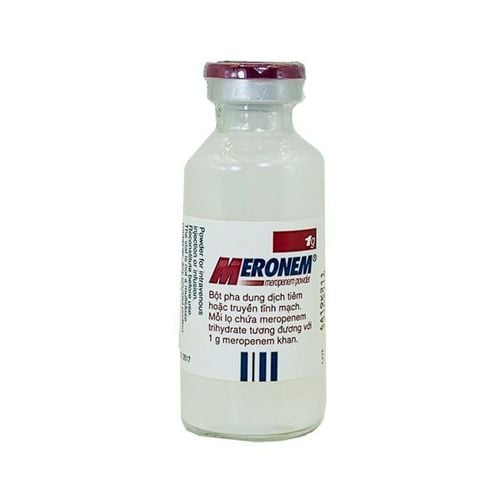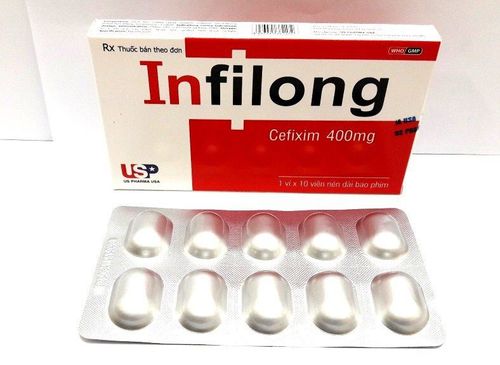This is an automatically translated article.
Spmerocin belongs to the group of drugs that treat parasites, infections, viruses and fungi. The drug contains the main ingredient is Meropenem (in the form of a mixture of Meropenem trihydrate and sodium carbonate) 1g, prepared in the form of powder for injection, packed in a box of 1 vial. Refer to some information about Spmerocin in the article below to help you know how to use the drug appropriately.
1. Uses of the drug Spmerocin
Spmerocin intravenous (IV) is indicated for the treatment of infections in adults and children caused by one or more microorganisms susceptible to Meropenem as follows:
Pneumonia and acquired pneumonia in hospital; Urinary tract infections; Abdominal infections; Gynecological infections, such as endometritis and pelvic inflammatory diseases; Skin and skin structure infections; Meningitis; Sepsis ; Suspected bacterial infection in febrile neutropenic adults as monotherapy or in combination with other antiviral or antifungal agents.
2. Dosage of the drug Spmerocin
Dosage of Spmerocin in adults:
Dosage and duration of treatment depend on the severity and type of infection as well as the patient's condition. The recommended daily dose of Spmerocin is as follows:
500 mg of Meropenem IV every 8 hours in the treatment of pneumonia, urinary tract infections or infections of gynecological, skin and skin structures. Administer 1g of Meropenem intravenously every 8 hours in the treatment of nosocomial pneumonia, peritonitis, and suspected bacterial infection in patients with leukopenia and sepsis. In the treatment of cystic fibrosis, doses of Spmerocin up to 2 g every 8 hours have been used. Most patients were treated with Spmerocin 2g every 8 hours. In the treatment of meningitis, the recommended dose is 2g every 8 hours. Particular caution should be exercised when meropenem is used as monotherapy in cases of serious or suspected lower respiratory tract infection with Pseudomonas aeruginosa. Sensitivity testing should be performed frequently when treating infections caused by Pseudomonas aeruginosa. Dosage of Spmerocin for adult patients with impaired renal function:
The dose of Spmerocin should be reduced in patients with creatinine clearance <51ml/min according to the following guidelines:
There is no experience using Spmerocin in patients undergoing peritoneal dialysis.
Spmerocin dose for patients with liver failure:
No dose adjustment of Spmerocin is required in these subjects. Dose of Spmerocin for elderly patients:
No dose adjustment of Spmerocin is required for elderly patients with normal renal function or creatinine clearance > 50ml/min. Dosage for children:
Children from 3 months to 12 years: The recommended dose of Spmerocin is 10-20mg/kg every 8 hours depending on the severity and type of infection. Children weighing more than 50 kg: It is recommended to use the same dose of Spmerocin as in adults. The recommended dose of Spmerocin for meningitis is 40 mg/kg every 8 hours. There is no experience using Spmerocin in children with renal failure. The above dose of Spmerocin is for reference only. The specific dose of Spmerocin will depend on the condition and the progression of the disease. To get the right dose of Spmerocin, patients need to consult their doctor/pharmacist.
3. Spmerocin overdose and treatment
Unintentional overdose of Spmerocin may occur during treatment, especially in patients with renal impairment. In the event of an overdose of Spmerocin, treat with symptomatic treatment. In normal subjects, the drug will be rapidly eliminated by the kidneys, while in patients with renal failure, hemodialysis will remove Meropenem and its metabolites.
4. Contraindications to the use of Spmerocin
Do not use Spmerocin for people with one of the following conditions:
Patients who are sensitive to the ingredients and active ingredients in the drug Spmerocin;
5. Drug interactions
To avoid unwanted interactions when using Spmerocin, patients should inform their doctor/pharmacist of all drugs, functional foods, vitamins... they are taking. Here are some drugs that may interact with Spmerocin:
Spmerocin may have interactions with Probenecid and anticoagulants. The concomitant use of Spmerocin with valproic acid/sodium valproate/valpromide is not recommended.
6. Side effects of the drug Spmerocin
Spmerocin can cause the following side effects for patients:
Reactions at the injection site such as thrombophlebitis, pain at the injection site. Systemic allergic reactions such as angioedema, anaphylaxis. Rash, pruritus, urticaria. Erythema multiforme, Stevens-Johnson syndrome, and toxic epidermal necrolysis. Abdominal pain, nausea and vomiting, diarrhea. Pseudomembranous colitis. Increased platelets, eosinophils. Reversible thrombocytopenia, white blood cell count, and neutrophil count. Hemolytic anemia. The Coombs reaction is positive. Decrease in partial thromboplastin time. Increased levels of bilirubin, transaminases, alkaline phosphatase and lactic dehydrogenase. Headache, paresthesia. Convulsions, oral and vaginal candidiasis. During the course of treatment, if there are any abnormal symptoms suspected of using Spmerocin, the patient should notify the treating doctor/pharmacist for timely treatment.
7. Be careful when using the drug Spmerocin
Partial cross-allergenicity between Carbapenem and Beta-lactam antibiotics, Penicillins and Cephalosporins may occur. Therefore, prior to initiating treatment with Spmerocin, the patient should be thoroughly inquired about a history of hypersensitivity reactions to the above-mentioned antibiotics. When administering Spmerocin to people with liver disease, the transaminase and bilirubin levels should be closely monitored. Spmerocin may increase the proliferation of organisms that are not sensitive to the drug, therefore continuous patient monitoring is required. Spmerocin should not be used in the treatment of infections caused by methicillin-resistant Staphylococcus aureus. Caution should be exercised when prescribing Spmerocin to patients with a history of gastrointestinal disease, especially colitis. Caution should be exercised when Spmerocin is used concomitantly with potentially nephrotoxic drugs. Spmerocin may decrease serum valproic acid levels. Efficacy and tolerability in infants younger than 3 months of age have not been established, therefore, the use of Spmerocin in infants under 3 months of age or in children with hepatic/renal dysfunction is not recommended. Spmerocin should not be used during pregnancy unless the benefits outweigh the possible risks to the fetus. If used, there should be direct supervision in this subject. Spmerocin should not be used in nursing women unless the potential benefits outweigh the possible risks to the infant. Above is information about uses, dosage and precautions when using Spmerocin. To ensure safety for your health and maximize the effectiveness of treatment, you need to take Spmerocin exactly as directed by your doctor.













